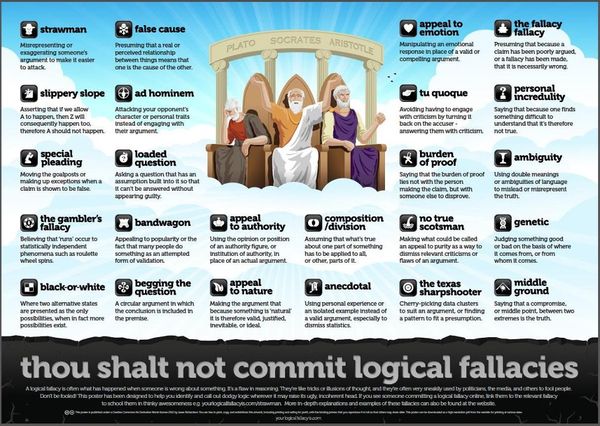Sometimes business feels like a debate. Other times, dinner conversation or a family discussion takes a contentious turn. In any case, here is a quick primer on logical fallacies.
A logical fallacy is a flaw in reasoning. In other words, logical fallacies are like tricks or illusions of thought. Consequently, they are
often used by politicians and the media.
It is fun to identify which of these certain people (including yourself) use when arguing.
TWENTY LOGICAL FALLACIES:
They fall into three main types: Distraction (10); Ambiguity (5); and Form (5).
A. Fallacies of Distraction
1. Ad baculum (Veiled threat): "to the stick":
DEF.- threatening an opponent if they don’t agree with you; EX.- "If you don’t agree with me you’ll get hurt!"2. Ad hominem (Name-calling; Poisoning the well): "to the man":
DEF.- attacking a person’s habits, personality, morality or character; EX.- "His argument must be false because he swears and has bad breath."3. Ad ignorantium (Appeal to ignorance):
DEF.- arguing that if something hasn’t been proved false, then it must be true; EX.- "U.F.Os must exist, because no one can prove that they don’t."4. Ad populum: "To the people; To the masses":
DEF.- appealing to emotions and/or prejudices; EX.- "Everyone else thinks so, so it must be true."5. Bulverism: (C.S. Lewis’ imaginary character, Ezekiel Bulver)
DEF.- attacking a person’s identity/race/gender/religion; EX.- "You think that because you’re a (man/woman/Black/White/Catholic/Baptist, etc.)"6. Chronological Snobbery
DEF.- appealing to the age of something as proof of its truth or validity; EX.-"Voodoo magic must work because it’s such an old practice;" "Super-Glue must be a good product because it’s so new."7. Ipse dixit: "He said it himself":
DEF.- appealing to an illegitimate authority; EX.- "It must be true, because (so and so) said so."8. Red herring (Changing the subject):
DEF.- diverting attention; changing the subject to avoid the point of the argument; EX.- "I can’t be guilty of cheating. Look how many people like me!"9. Straw Man:
DEF.- setting up a false image of the opponent's argument; exaggerating or simplifying the argument and refuting that weakened form of the argument; EX.- "Einstein's theory must be false! It makes everything relative–even truth!"10. Tu quoque: "You also"
DEF.- defending yourself by attacking the opponent; EX.- "Who are you to condemn me! You do it too!"
B. Fallacies of Ambiguity
1. Accent:
DEF.- confusing the argument by changing the emphasis in the sentence; EX.- "YOU shouldn’t steal" (but it’s okay if SOMEONE ELSE does); "You shouldn’t STEAL" (but it’s okay to LIE once in a while); "You SHOULDN’T steal (but sometimes you HAVE TO) ."2. Amphiboly: [Greek: "to throw both ways"]
DEF.- confusing an argument by the grammar of the sentence; EX.- "Croesus, you will destroy a great kingdom!" (your own!)3. Composition:
DEF.- assuming that what is true of the parts must be true of the whole; EX.- "Chlorine is a poison; sodium is a poison; so NaCl must be a poison too;" "Micro-evolution is true [change within species]; so macro-evolution must be true too [change between species]."4. Division:
DEF.- assuming that what is true of whole must be true of the parts; EX.- "The Lakers are a great team, so every player must be great too."5. Equivocation:
DEF.- confusing the argument by using words with more than one definition; EX.- "You are really hot on the computer, so you’d better go cool off."
C. Fallacies of Form
1. Apriorism (Hasty generalization):
DEF.- leaping from one experience to a general conclusion; EX.- "Willy was rude to me. Boys are so mean!"2. Complex question (Loaded question):
DEF.- framing the question so as to force a single answer; EX.- "Have you stopped beating your wife yet?"3. Either/or (False dilemma):
DEF.- limiting the possible answers to only two; oversimplification; EX.- "If you think that, you must be either stupid or half-asleep."4. Petitio principii (Begging the question; Circular reasoning):
DEF.- assuming what must be proven; EX.- "Rock music is better than classical music because classical music is not as good."5. Post hoc ergo propter hoc (False cause): "after this, therefore because of this;"
DEF.- assuming that a temporal sequence proves a causal relationship; EX.- "I saw a great movie before my test; that must be why I did so well."
via Oxford Tutorials


